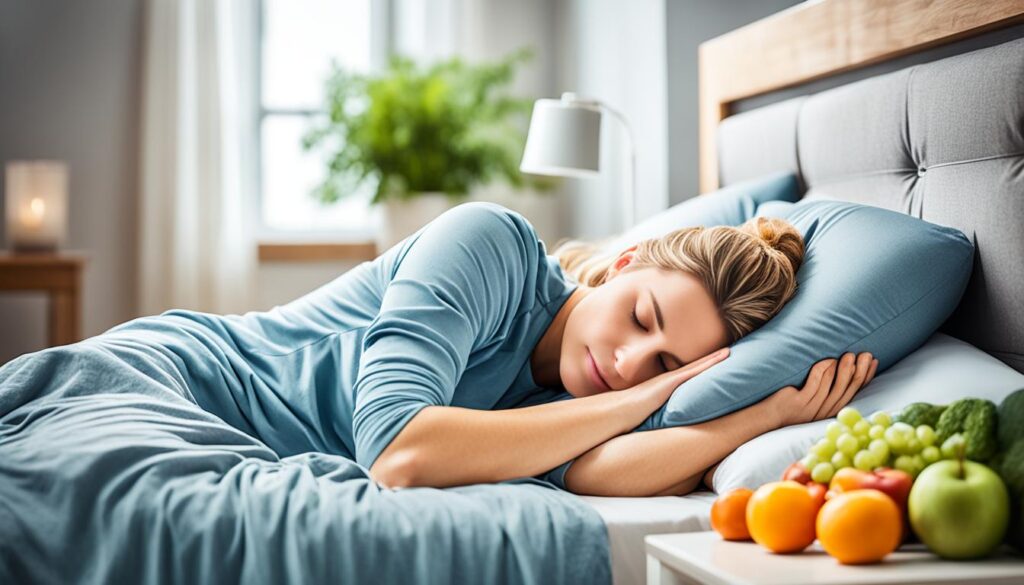Sleep is extremely important, but it often doesn’t get the attention it deserves. It is crucial for our physical, mental, and emotional health.1 However, many of us give up sleep to do more work, have fun, or meet our obligations. This article looks at how sleep helps our bodies, minds, and emotions. We will see how it supports our immune system, helps us manage stress, and builds resilience.2 Knowing the many advantages of sleep will help you choose to make it a priority every day.
Key Takeaways
- Sleep is essential for physical, mental, and emotional well-being.
- Lack of sufficient sleep can impair attention, reduce alertness, and hinder cognitive functions.1
- Consistent sleep schedules can help regulate the body’s internal clock and promote better sleep quality.1
- Sleep deprivation can lead to reduced productivity, lower quality work outcomes, and increased errors.1
- Creating a sleep-friendly environment can enhance sleep quality.1
The Restorative Power of Sleep
Sleep is more than just a time of rest. It’s key to how healthy we are. While we sleep, our bodies do many important things. These help us stay physically, mentally, and emotionally well.
Sleep’s Role in Physical Recovery and Repair
Getting good sleep helps our brain work better. It helps us remember and learn. Our brain health is very connected to how well we can pay attention and focus.
Sleep and Immune System Support
Our immune system gets a big boost from sleep. When we sleep, our bodies make cytokines. These are proteins that fight off bad stuff like infections and inflammation.3 Making sure we sleep enough means better recovery and a stronger immune system.
Sleep and Mental Well-being
Sleep is super important for our mental health. Research shows getting enough sleep is key. It helps us control our emotions, making us less prone to sudden mood changes.4 Being well-rested boosts our ability to deal with stress, keep a positive attitude, and concentrate on what we need to do.4
Sleep’s Impact on Emotional Resilience
Good sleep also boosts our emotional strength. It helps us remember and process emotions better. This means we can deal with stress smarter, making us emotionally stronger overall.4 Making sure we get quality sleep is a top way to deal with stress better.
>> Order your Yogasleep Dohm Classic machine now and experience the difference tonight!
Sleep and Stress Management
When we sleep well, we’re better at handling stress.4 Sleep keeps our hormones, like cortisol, in check. So, we stay emotionally balanced and can face challenges with a calm mind.4 People who make sleep a priority are more resilient to stress and generally feel better mentally.
Productivity and Performance: Maximizing Your Potential
Sleep is key for better concentration, focus, and work output. Ensuring we get enough high-quality sleep boosts our brain power. This makes us perform better in everything we do. Sleep helps our brain work well, keep memories strong, and learn easier. This all links to being more alert and focused. Finding the right balance with rest is crucial.
How sleep affects concentration, focus, and Productivity
Not enough sleep lowers our attention and harms focus. This makes it hard to stay on task, reducing how much we achieve. Studies show that 38% of U.S. workers are tired at work from lack of sleep.5 This shows how big an issue poor sleep is for work results.
Strategies for optimizing sleep to enhance performance and efficiency
To do better at concentration, focus, and productivity, we have to sleep smarter. This means setting a good sleep schedule, making our sleeping place the best it can be, and sticking to a bedtime routine. It also means saying no to too many stimulants, keeping stress in check, and making our workspace good for working.5 Doing these things lets us use the power of sleep to boost how well we work.
The cost of bad sleep at work is huge.5 It can cost employers nearly $2,000 per worker each year. The big picture is that poor sleep leads to around $136.4 billion in lost productivity in the U.S. yearly.5 So, getting good sleep isn’t just for feeling good. It’s also about doing well at work and making the business successful.
It’s also important to switch off from work when not working. This way, we lessen how much stress from work affects us.5 Keeping a good work-life balance and making time for sleep helps a lot. It protects our well-being.
People who work shifts, like in factories, hospitals, or flying, often have trouble sleeping. Their unusual work hours don’t match natural sleep times.5 It’s vital to address their specific sleep issues. This helps them avoid being too tired at work and stay safe on the job.
Knowing how sleep influences our work and focus is key. Making smart choices about rest is powerful. It lets us fully use our capabilities and succeed, at work and in life.
The Enemy Within: Sleep Deprivation

Skipping sleep often shows on our bodies.6 The National Sleep Foundation notes 70 million Americans don’t get enough sleep. It’s a major health issue in the U.S.6 This issue leads to dark circles, puffy eyes, and a tired look.6 It also costs the U.S. about $65 billion in healthcare and work loss every year.
Sleep loss hurts more than just looks.6 Around 30-35% of people have a hard time sleeping, and6 not getting enough sleep can make us anxious, stressed, and irritable.7 It can even make us seem older in brain tests. Researchers say it’s as if we’ve aged eight years after not sleeping well for a while.
Bad sleep can add pounds, too.7 Teens sleeping less than six hours a night are more likely to try alcohol, tobacco, or marijuana. They’re also more likely to consider suicide.7 Little sleep early in life affects how our brains and social skills develop.
It’s crucial to escape the trap of sleep loss and value good sleep.7 Most adults need between seven to nine hours of sleep.7 About half the people are either night people or morning people, a study found in 2017.
Strategies for Improving Sleep Hygiene: Creating an Ideal Sleep Environment
Getting good and refreshing sleep is key for our health. Experts say keeping a steady sleep schedule is vital.8
Establishing a Consistent Sleep Schedule and Routine
First, figure out how many hours of sleep you need. Most people need 7-8 hours a night. Make a regular bedtime and stick to it. Waking up at the same time every day is also important. This helps your body get into a natural sleep cycle.9
Having a relaxing evening routine is crucial. Try gentle stretches, reading, or meditation before bed. This tells your body it’s time to relax and prepare for sleep.9
Make your bedroom a restful haven by keeping it dark and quiet. Choose a comfy mattress and bedding. Keep the temperature cool, around 60 to 67°F (15.6 to 19.4°C). Avoid the blue light from screens before bedtime. For those who wake up easily, earplugs or a white noise machine might be helpful.9
By following these tips, you can greatly improve how well you sleep. Good, regular sleep is crucial for your health. It helps your body heal, boosts your immune system, and supports your mind and thinking.9 Taking care of your sleep is an investment in your future happiness.
Sleep and human health

Sleep is key to our complete well-being because it boosts our physical, mental, and emotional health. Adults need around 7 to 8 hours of sleep every night for their health3. Babies, on the other hand, require about 16 hours, young children need at least 10 hours, and teenagers should aim for 9 hours3. Unfortunately, about 70 million Americans struggle with getting enough sleep, regardless of their age3.
Sleep is more than simply resting. It’s a critical time for our bodies to heal and recharge. Our brain goes through different stages during sleep. This includes times of deep relaxation mixed with phases where dreams occur10.
Getting good sleep goes beyond just helping our bodies. It strongly supports our immune system, which keeps us healthy. It aids in memory, fights off diseases, and repairs our body after being sick10. Plus, it helps our brain get rid of harmful waste, lowering the chances of inflammation and damage to our cells10.
On the flip side, lacking sleep or having poor quality sleep can seriously damage our health. For instance, sleep apnea can increase the risk of stroke. Not getting enough sleep might lead to obesity, heart issues, and make you more prone to diseases like diabetes3. If you regularly have trouble sleeping, it can cause serious issues during the day, like trouble focusing or constant tiredness3.
To be as healthy as possible, we must value and prioritize good sleep. Enacting good sleep habits, like having a bedtime routine and avoiding screens before bed, can vastly improve the quality of our sleep and, thus, our health10. Recognizing how crucial sleep is to our health helps us take steps to ensure we get enough rest. This way, we’re more prepared to face each day’s challenges.
Embracing the Dreamscape: The Importance of REM Sleep
REM (Rapid Eye Movement) sleep is crucial for a good night’s rest.11 It helps keep our minds healthy. During REM sleep, we remember, deal with feelings, and solve problems creatively. It’s key for unlocking creativity and emotional strength.12 Studies show dreams can boost creativity up to 32% during REM sleep.12
Knowing the value of REM sleep lets us appreciate our dreams. This leads to better sleep and better health.12 Adults spend 20-25% of sleep time in REM, which is a lot.12 About 55% of people will have a lucid dream at some point.12 This shows how common and powerful this dream state is.
Dream meanings change with culture, but everyone needs REM sleep.12 New technology like neurofeedback and virtual reality is changing how we look at dreams.12 This is a big step in dream research and shows REM sleep’s big role in our minds and feelings.
By valuing REM sleep and our dreams, we learn more about ourselves. We get more creative and emotionally strong. Our night dreams and day experiences are linked, showing the deep impact of sleep on our minds and potential.11
Conclusion
We now know how essential sleep is for our health and well-being. Sleeping well helps our bodies and minds work better.13 It supports our immune system and helps us think clearly and stay calm. So, getting enough sleep is key to feeling good.13
To sleep better, we can follow the tips we’ve shared. They cover creating a great sleep space and using melatonin and REM sleep well.13 Better sleep leads to more energy and a happier you. This can help you do better in every part of your life, from work to personal goals.14
Sleep should be at the top of our to-do list every day, not an afterthought. Seeing sleep as important helps us be our best. It makes us smarter emotionally and ready to face life’s challenges.14 By valuing sleep, we can truly change our lives for the better.
FAQ
What is the role of sleep in physical recovery and repair?
Sleep is crucial for the body to recover and fix itself. It lets our mind consolidate memories and improves learning and memory. Sleep is also key for maintaining good brain health, which boosts our concentration and focus. It supports the immune system by helping produce cytokines, which fight off illness and reduce inflammation.
How does sleep impact mental well-being and emotional resilience?
Getting enough sleep is vital for our mental health. It supports emotional balance, reducing mood swings and instability. When we sleep well, we’re better at dealing with stress and keeping a positive attitude. It solidifies emotional memories, helping us deal with our feelings better and enhancing our mental health.
What is the connection between sleep and concentration, focus, and productivity?
Good sleep is critical for our focus and productivity. Quality sleep boosts our cognitive abilities, making us work more efficiently. It helps in brain function recovery, memory strengthening, and learning, all important for staying on task and being productive. Without enough sleep, our attention and alertness drop, making it hard to focus and increasing our errors.
How does sleep deprivation affect our physical appearance and overall health?
Skipping sleep affects how we look and feel. It causes under eye circles, puffiness, and dull skin. Missing out on sleep can also harm our health, leading to more sickness, trouble thinking, and possibly gaining weight.
What are the strategies for improving sleep hygiene and creating an ideal sleep environment?
Improving sleep hygiene starts with keeping a steady sleep routine. Decide on the best amount of sleep for you, and stick to a regular bedtime and wakeup time. It’s also important to wind down before sleep with a calming routine. Make your bedroom a comfortable, quiet place. Try not to consume caffeine or nicotine before bed.
What is the significance of REM sleep, and how does it impact our mental well-being?
REM sleep is essential for a good night’s sleep and our mental health. It helps our brain sort emotions, memories, and even solve problems creatively. Dreaming is important as it enhances our creativity and emotional strength.
Source Links
- https://medium.com/@drcpanda/unlocking-the-power-of-sleep-the-vital-role-of-restful-nights-for-optimal-health-and-well-being-d6a7e61c57f1
- https://privatemds.com/unlocking-the-power-of-sleep/
- https://newsinhealth.nih.gov/2013/04/benefits-slumber
- https://www.ncbi.nlm.nih.gov/pmc/articles/PMC7826982/
- https://www.sleepfoundation.org/sleep-hygiene/good-sleep-and-job-performance
- https://www.ncbi.nlm.nih.gov/pmc/articles/PMC2862829/
- https://www.psychologytoday.com/us/articles/201905/the-new-science-sleep
- https://www.sleepfoundation.org/sleep-hygiene
- https://www.healthline.com/health/sleep-hygiene
- https://news.uchicago.edu/explainer/how-sleep-affects-human-health-explained
- https://www.linkedin.com/pulse/journey-night-exploring-sleep-dreams-intriguing-connection-singh
- https://medium.com/@asheradefioye/sweet-dreams-and-surreal-adventures-unraveling-the-science-of-dreams-fec09ada46d0
- https://www.ncbi.nlm.nih.gov/pmc/articles/PMC8494094/
- https://www.ncbi.nlm.nih.gov/pmc/articles/PMC6473877/




